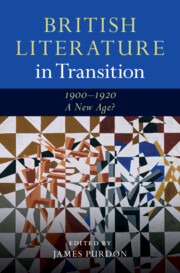Book contents
- British Literature in Transition, 1900–1920: A New Age?
- British Literature in Transition Series
- British Literature in Transition, 1900–1920: A New Age?
- Copyright page
- Contents
- Contributors
- General Editor’s Preface
- Acknowledgements
- Introduction
- Part I Nation and Empire
- Chapter 1 Aliens
- Chapter 2 Oceanic States
- Chapter 3 Passage Work
- Chapter 4 Anglo-Irish Transitions
- Chapter 5 British War Writing
- Chapter 6 Capturing Home
- Part II Media
- Part III Aesthetics
- Part IV Society
- Index
Chapter 6 - Capturing Home
British First World War Poetry
from Part I - Nation and Empire
Published online by Cambridge University Press: 07 December 2021
- British Literature in Transition, 1900–1920: A New Age?
- British Literature in Transition Series
- British Literature in Transition, 1900–1920: A New Age?
- Copyright page
- Contents
- Contributors
- General Editor’s Preface
- Acknowledgements
- Introduction
- Part I Nation and Empire
- Chapter 1 Aliens
- Chapter 2 Oceanic States
- Chapter 3 Passage Work
- Chapter 4 Anglo-Irish Transitions
- Chapter 5 British War Writing
- Chapter 6 Capturing Home
- Part II Media
- Part III Aesthetics
- Part IV Society
- Index
Summary
The poetry of the First World War would normally be seen in terms of a transition from the fantasies of war to the realities of war, or from the ‘pro-war’ to the ‘anti-war’, from immature Owen to mature Owen, from Rupert Brooke to Siegfried Sassoon. And yet some of the most important poetry to emerge during these years was arguably either unrelated to the realities of war or barely engaging with it: Edward Thomas’s poetry (published 1917 and 1918), for instance, does not easily fit into any critical approach that emphasises the blood and mud of the trenches. Or, as the title of Ivor Gurney’s collection Severn and Somme (1917) would suggest, any emphasis on the Western Front was seen in relation to home: an imagined home untouched by war, or a home of the past and future. This chapter shows how the poetry of the ‘war poets’ frequently has as much to do with Britain’s domestic affairs as with the fighting itself, exploring themes that all connect somehow to social inequality and social unrest: topics such as class, home ownership, poverty, the role of the Church, women’s careers, national identity, access to education, access to beauty, and the relationship between town and country.
- Type
- Chapter
- Information
- British Literature in Transition, 1900–1920: A New Age? , pp. 122 - 136Publisher: Cambridge University PressPrint publication year: 2021

